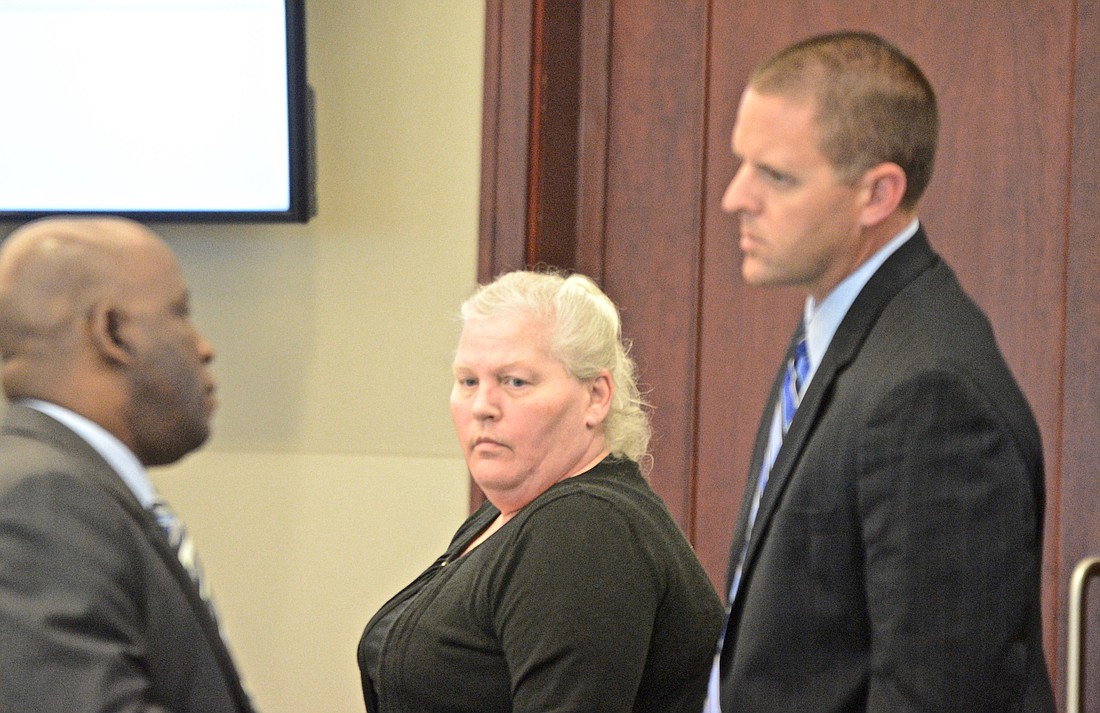- December 15, 2025

By the time Flagler County Sheriff’s Office detective Annie Conrad walked the property at 80 Pine Tree Lane and noted the odd-looking mound of brush, covered by an overturned jon boat, beneath which deputies would later uncover the decomposing, gunshot-riddled body of Charles Singer, Conrad had visited to speak with Charles’ wife Dorothy Singer multiple times about Dorothy Singer’s missing husband.
Family members of Charles, who went by “Butch,” had reported him missing, and Dorothy, when questioned, had said that after an argument with her, her husband left one night with someone else in a dark car and that she didn’t know where he was.
But all along, Conrad and Detective Jodie Glasgow testified during Dorothy Singer’s murder trial May 15, Dorothy Singer knew exactly where he was: She’d shot him five times, wrapped him in his own bedding, used his credit card to buy mothballs and a tarp to cover his body with, then buried him in the yard, heaped branches atop him and placed the jon boat on top. The moth balls were placed around the body, presumably to cover the stench of decomposition.
That Dorothy Singer shot her husband and buried him in the yard — then continued living at the house and claimed no knowledge of his whereabouts as his family grew frantic because they hadn’t heard from him — isn’t in dispute in her murder case.
The defense conceded during opening statements in court May 15 that Dorothy killed and buried Charles. But her attorneys, Junior Barrett and Kevin Carlisle, alerted that the killing was accidental and in self-defense, occurring during a struggle in which the two fought over a firearm.
“The evidence will tell you that when he got shot that night, Mrs. Singer was fighting for her life,” Barrett told the jury. “In that moment it was life or death for her, and to choose life meant that her abuser had to die.”
The defense also asserted during opening statements that Charles Singer had beaten Dorothy, but, as of the end of the first day of proceedings May 15, had not yet called witnesses who they said would testify to seeing signs of injury on her.
Charles Singer was killed sometime between Feb. 8 and Feb. 10, 2017, shot five times — once in the chest, four times in the head — with a Winchester 22-caliber handgun.
He was 48 and legally blind, although he could see somewhat when wearing glasses.
Deputies arrested Dorothy Singer on May 9 on State Road A1A as she tried to flee the county. It was several weeks after detectives uncovered Charles Singer’s body, and she’d left something else behind for them to find.
“I remember bits and pieces. I was sitting on the ground at his head and I remember unloading the gun,” she’d written in a suicide note that prosecutor Jennifer Dunton quoted at the opening of the trial.
But Dunton said Singer was never planning to commit suicide. Instead, Dunton said Singer had read an article about the case on FlaglerLive.com, and “got spooked. ... So she came up with a plan with her family and a family friend to fake her death and flee the jurisdiction, and that’s what she did.”
That brazen fabrication, according to the prosecution, was one of many woven by Dorothy Singer as she tried to cover up her husband’s death and escape the consequences of killing him.
After his death, Singer kept her husband’s phone, and impersonated him through text messages.
Rose Carver, Charles Singer’s mother, told the court about how she’d grown increasingly concerned at her son’s disappearance.
First, Dorothy and Charles and announced that they were coming to a family baby shower, then skipped at the last minute.
Dorothy Singer told some friends and family members that Charles Singer was working in Georgia, and told others he was working in Kentucky.
But Charles Singer had always spoken regularly with his mother by phone, and she was worried. So Dorothy Singer came up with another story, telling Carver that Charles had been busted for keeping a meth lab and that he was on the run from the FBI. “Mom, I’m OK,” said one text to Carver.
Speaking wth Glasgow and Conrad, Dorothy Singer, before her arrest, made a series of disparaging statements about Charlie Singer and his friends, saying they were involved in drugs and were “nasty.” She said she’d told Charles to choose between her and drug business, and that he’d left because he’d chosen the drugs.
In later interviews with the detectives that the prosecution played for the jury, she said that he’d beaten her and that she’d told him he could either leave or be arrested. She called him “mean” and “hateful.”
She said she’d sent her mother photos of marks left on her body from when he’d beaten her. Detectives contacted her mother, who didn’t have the pictures.
As the investigation progressed, detectives got financial records showing that Dorothy Singer — despite her assertions that her husband had left with his wallet and that she didn’t have access to his money — was using his bank and EBT cards.
Cell phone company records showed that whenever text messages were sent from his phone after his death, his phone was right next to her phone.
The trial continues at 9:15 a.m. Thursday, May 18.